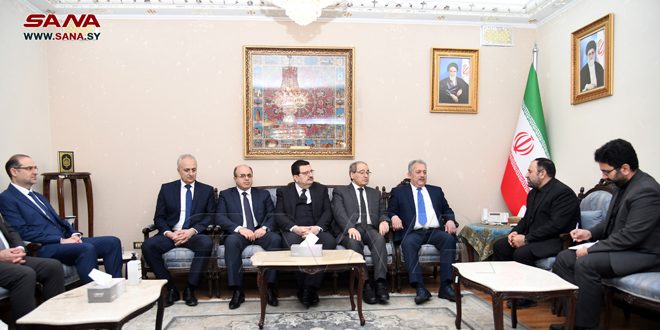In a notable escalation of tensions in the Middle East, a series of high-level diplomatic engagements and international condemnations have unfolded following a violent attack on the Iranian consulate in Damascus, Syria. This event, characterized by Syrian and Iranian officials as an act of “Israeli terrorist aggression,” resulted in the death of several individuals, described as martyrs, and left others wounded.
Prime Minister of Syria, Hussein Arnous, made a significant visit to the Islamic Republic of Iran Chancery in Damascus to denounce the assault and extend his condolences to the families of the deceased, reiterating Syria’s steadfastness against acts that challenge its sovereignty and the broader regional push for independent governance. Arnous’s visit underscored the Syrian government’s solidarity with Iran, expressing a collective resilience against external pressures and aggressions.
Similarly, Syria’s Foreign and Expatriates Minister, Fayssal Mikdad, engaged in direct communications with his Iranian counterpart, Hossein Amir Abdollahian, to condemn the attack vigorously. Mikdad’s actions, including a personal visit to the Iranian chancery to ensure the safety of its staff, highlighted a unified front against what both nations perceive as Israeli provocations. The conversations between the two ministers emphasized a mutual commitment to stand against aggressions and maintain the integrity of their bilateral relations amidst challenges.
Iranian Foreign Minister Abdollahian signalled the attack’s broader implications by reaching out to the international community, notably sending a message through the Swiss Embassy in Tehran to the U.S. administration. This move points to Iran’s strategy of framing the attack within the context of U.S. support for Israel, thereby calling for accountability at an international level.
The incident has drawn sharp criticisms from various quarters of the international community, including Pakistan and China, both of which have condemned the attack in strong terms. Pakistan’s response, articulating the assault as a grave violation of international law and a threat to regional stability, alongside China’s condemnation, emphasizes the global concern over the sanctity of diplomatic missions and the sovereignty of nations.
Egypt, too, has voiced its condemnation, aligning with the broader consensus against the infringement of diplomatic norms and the violation of Syrian sovereignty. This collective regional and international denunciation of the attack on the Iranian consulate illustrates the complex interplay of diplomacy, sovereignty, and the rule of law in managing interstate relations and conflicts.
The unfolding situation underscores a critical juncture in Middle Eastern politics, where acts of aggression not only provoke immediate bilateral tensions but also attract global attention, demanding a recalibration of diplomatic and strategic approaches to ensure peace and stability in a historically volatile region.
This article was translated and edited by The Syrian Observer. The Syrian Observer has not verified the content of this story. Responsibility for the information and views set out in this article lies entirely with the author.


